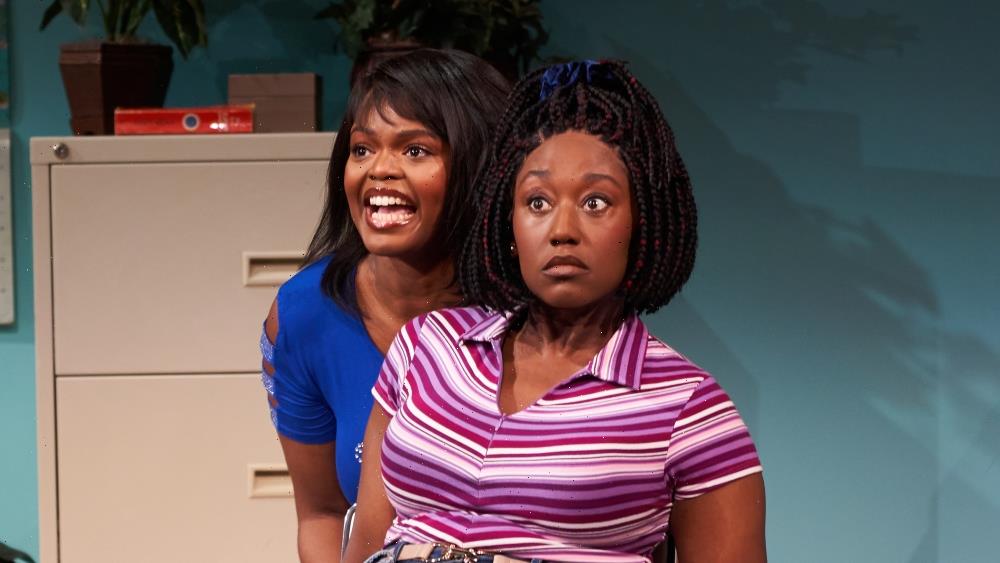If the team of Ghanaian-American playwright Jocelyn Bioh (“School Girls; or, the African Mean Girls Play”) and Kenyan-born director Saheem Ali brings nothing else to the stages of New York City, they are, most certainly, providers of both laugh-lines, and real and powerful exaltation. With their summer remix of “Merry Wives of Windsor” for the Public Theater’s Free Shakespeare in the Park program, it’s clear that connecting gleeful, even goofy, spiritualized comedy to soap opera-ish scenarios is this pair’s stock-in-trade.
“Nollywood Dreams,” the latest project from Bioh and Ali, uses a similarly soapy sudsiness (minus any Shakespearian heft) to tell a giddy, romantic, comic tale of 1990s Nigeria, its then-bourgeoning film trade and the serious lifelong hopes of all of its passionate players.
Bioh’s often bedazzled, broad-stroked characters — narrowly avoiding cliché thanks to the finessed and dexterous abilities of their actors — include two sisters dreaming of better lives: Ayamma (an open-faced, would-be actress) and Dede Okafor (a snarky spellcaster), portrayed, respectively, by Sandra Okuboyejo and Nana Mensah. The desire of these characters to ameliorate their lives is directly related to real life in Nigeria in the ’90s, a place and time where bettering oneself to live an upper crust life, rather than remain working class, was a daily topic of conversation in every Nigerian medium.
Along with the sisters quibbling for position and paramours, there is the totemic, Oprah-of-Lagos talks how host, Adenikeh, played by the equally grand and singularly-named Abena (who was also part of Ali and Bioh’s “Merry Wives” cast). There is Nigeria’s hottest-ever leading man, Wale Owusu (Ade Otukoya). Then, there is the former couple, currently at odds: the childhood sweetheart-star looking for a fresh break, Fayola Ogunleye (Emana Rachelle), and Nigeria’s brand-name director Gbenga Ezie (Charlie Hudson, III), hoping to cast someone outside-the-box in his newest melodrama, “The Comfort Zone.” (Corny but true, the name of the leading lady that Ezie must cast is named Comfort in his new script).
Harmonizing like a finely tuned musical ensemble scoring a screwball comedy with a message, the “Nollywood” sextet and its offstage creatives hit all of the right notes with genuinely funny fluidity and physical humor that lightly touches on the economic and political turmoil of ’90s Nigeria.
In particular, Mensah and Abena play the grandeur of each of their characters with flighty lyrical highs, and deep, bold, swanning lows. As the glue that binds Nigerian celebrity in happily histrionic reverie, Abena’s Adenikeh is dazzling as she twitches, kvetches and lusts after her guest charges. Either Abena gets a role in a new streaming comedy immediately, or the flashy Adenikeh character gets her own talk show, stat.
Meanwhile, each ensemble member has shining moments and a shot at Bioh’s thrilling repartee. The hurt that exists between Rachelle’s Ogunleye and Hudson’s Ezie — two lovers who gave up their heritages in search of success — or the desire of Okuboyejo’s Ayamma to be respected as an artist, not a girlfriend, are key to understanding Bioh’s human comedy.
Mounted by Ali with scenic designer Arnulfo Maldonado, the intimate staging at MCC’s Newman Mills Theater allows the story to move easily between settings such as the sisters’ family travel agency, Ezie’s film studio offices and Adenikeh’s brassy talk show.
Bioh’s dialogue is purposefully sitcom-ish and charming, whether it’s exaggerated or playing to emotions more subtle, and her language is seamless. Never allowing herself to be held down by the weighty, social-cultural constructs of class and money in Nigeria in the ’90s, Bioh’s fast-moving comic text is warm, wonky and laugh-out-loud funny. With that pace, cast and musicality, this version of Nollywood is, indeed, a dream.
Source: Read Full Article
